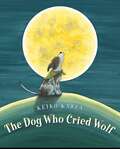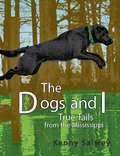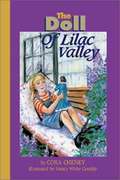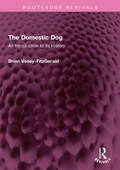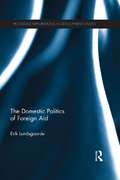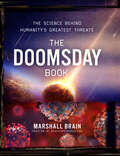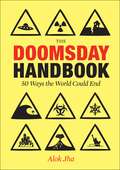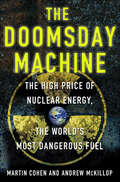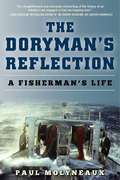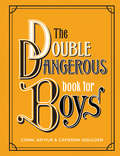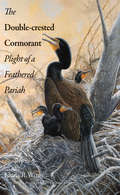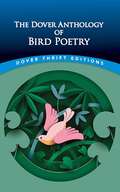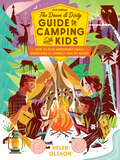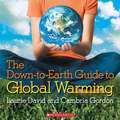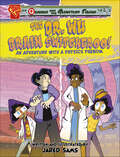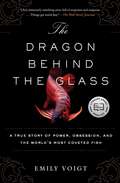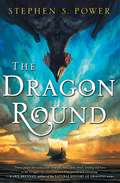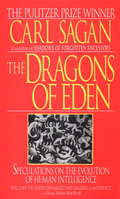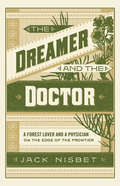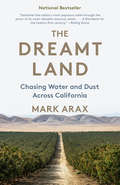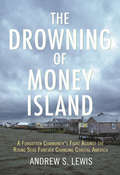- Table View
- List View
The Dog Who Cried Wolf
by Keiko KaszaMoka is a good dog. But when Michelle, his little girl, reads him a book about wolves, being a good dog suddenly seems awfully boring. Wolves get to run around doing whatever they want. No one ever makes a wolf dress up for a tea party.So Moka decides to run away to the wild. But what will happen when the real wolves show up?For any kid who's tired of being good, Moka's antics will be a vicarious treat.
The Dogs and I
by Kenny SalweyJoin Kenny and the dogs who have been his companions for over fifty years. Readers will delight in dog days along the Mississippi with Rover the mutt, Pepper the rat terrier, and many more. Humorous, warm, and adventure-filled, these stories are a must for dog and outdoor lovers everywhere.
The Doll of Lilac Valley
by Cora Cheney Nancy White CassidyWhile spending her first summer away from home, nine-year old Laurie loses her favorite doll but then finds another, with surprising results. She learns independence and learns about making hard choices for the good of others in a Fresh Air project that introduces city children to country life.
The Domestic Dog: An Introduction to its History (Routledge Revivals)
by Brian Vesey-FitzGeraldFirst published in 1957, The Domestic Dog is the introduction to the history of man’s best friend, with special reference to Great Britain. After discussing the natural history of the Canidae and the possible sources of domestication, Mr. Vesey-FitzGerald surveys the career of the domestic dog from its beginnings in pre-historic times through to its present position as household companion and pet. He pays particular attention to the early literature of the dog and, even more particularly, to representations of the dog by the great artists of the world, since he believes that much of the history of the individual breeds can be traced in this way. He discusses the part played by the dog in war, in sport, and in the day-to-day occupations of man. He traces the development of breeding for Show and the growth of the Dog Show from the local rivalry of a few enthusiasts to a vast and complicated business, and considers the effect of breeding for Show on the dog as an animal. Finally, he discusses the most controversial subject, the classification of the domestic dog, and gives brief histories and descriptions of the various breeds. This book will be of interest to students of history, veterinary science as well as to anyone with a love for dogs.
The Domestic Politics of Foreign Aid (Routledge Explorations in Development Studies)
by Erik LundsgaardeIn spite of shared rhetorical commitments to tackling poverty worldwide, donors have varied considerably in their use of aid as an instrument for global poverty reduction. This book explains varied donor priorities by examining how societal actors, governmental actors, and the institutions that regulate their interactions influence development policy choices. The Domestic Politics of Foreign Aid challenges explanations for donor generosity that identify humanitarian values, partisan politics, and welfare state institutions as key determinants of aid-giving patterns. It explains how the preferences of diverse sets of actors are amalgamated in the domestic political arena to shape national preferences for international redistribution. Drawing on interview research conducted with a variety of stakeholders in four donor countries (Denmark, France, Switzerland and the United States) and an extensive review of primary and secondary sources on aid politics in the countries studied, the book offers both a static overview of the characteristics of aid policymaking systems and a historical treatment of policymaking dynamics over a 25-year period (1980-2005). Applying a common theoretical framework to the four case studies and using development NGO advocacy as a starting point for examining the politics of aid, this book provides a synthesis of several strands of theoretical work dealing with interest group politics and political institutions to inform the analysis of the societal and governmental determinants of aid choices.
The Doomsday Book: The Science Behind Humanity's Greatest Threats
by Marshall BrainHow might the world as we know it end? In this illustrated guide, How Stuff Works author Marshall Brain explores myriad doomsday scenarios and the science behind them. What if the unimaginable happens? A nuclear bomb detonates over a major city, for example, or a deadly virus infects millions around the world. There are other disasters we don&’t even have to imagine because they&’ve already occurred, like violent hurricanes or cataclysmic tsunamis that have caused horrific loss of life and damage. In The Doomsday Book, Marshall Brain explains how everything finally ends—the decimation of nations and cities, of civilization, of humanity, of all life on Earth. Brain takes a deep dive into a wide range of doomsday narratives, including manmade events such as an electromagnetic pulse attack, a deadly pandemic, and nuclear warfare; devastating natural phenomena, such as an eruption from a super-volcano, the collapse of the Gulf Stream, or lethal solar flares; and science-fiction scenarios where robots take over or aliens invade. Each compelling chapter provides a detailed description of the situation, the science behind it, and ways to prevent or prepare for its occurrence. With fun graphics and eye-catching photographs at every turn, The Doomsday Book will be the last book you&’ll ever have to read about the last days on Earth.Scenarios include: - Asteroid Strike: a massive asteroid could obliterate life—just as it might have killed the dinosaurs. - Gray Goo: self-replicating nanobots engulf the planet. - Grid Attack: an attack on our power grid shuts down the internet, affecting airports, banks, computers, food delivery, medical devices, and the entire economic system. - Gulf Stream collapse: the shutdown of this important ocean current causes temperatures to plummet. - Ocean acidification: if the oceans&’ pH levels shift due to a rise in carbon dioxide, all marine life could die.
The Doomsday Handbook
by Alok JhaWe live in a world positively teeming with threats and apocalyptic scenarios. Many of them are familiar: terrorism, deadly viruses, global warming and war, but many others most of us can't even imagine: self-replicating nanobots that can devour an entire planet, high-energy experiments that threaten to suck the Earth into a mini black hole, and even super-sophisticated scientific contraptions that can put an end to the entire universe.
The Doomsday Machine: The High Price of Nuclear Energy, the World's Most Dangerous Fuel
by Martin Cohen Andrew McKillopToday, there are over one hundred nuclear reactors operating in our backyards, from Indian Point in New York to Diablo Canyon in California. Proponents claim that nuclear power is the only viable alternative to fossil fuels, and due to rising energy consumption and the looming threat of global warming, they are pushing for an even greater investment. Here, energy economist Andrew McKillop and social scientist Martin Cohen argue that the nuclear power dream being sold to us is pure fantasy. Debunking the multilayered myth that nuclear energy is cheap, clean, and safe, they demonstrate how landscapes are ravaged in search of the elusive yellowcake to fuel the reactors, and how energy companies and politicians rarely discuss the true costs of nuclear power plants - from the subsidies that build the infrastructure to the unspoken guarantee that the public will pick up the cleanup cost in the event of a meltdown, which can easily top $100 billion dollars.
The Doryman's Reflection: A Fisherman's Life
by Paul MolyneauxWhat happens when the oceans are emptied of all their fish? What happens when three hundred years of human knowledge and expertise disappear before the onslaught of the technology-driven world?The Doryman’s Reflection is simply the most accurate and eloquent account of what transpired in the New England fisheries over the past half century, as told by the people who lived it, including author Paul Molyneaux.Fishermen survive as relics, the last hunter-gatherers among us. Their boats, crammed with ropes and nets, carry the mystique of a nearly forgotten world ruled by the elements. Now an accomplished writer, Molyneaux as a young man journeyed to Maine with no experience and a dream of working on a boat. This is the story of his apprenticeship with Bernard Raynes, one of Maine’s last independent commercial fishermen.The Doryman’s Reflection speaks to those who want to know what really happened, and what will happen, on our oceans.Part coming-of-age memoir, part biography, it is a very personal account of what families in this dying but important industry face each day. Molyneaux shares his own history as a young man seeking the fisherman’s life in Maine and Alaska. Originally published in 2005, it has been thoroughly updated to cover the events of the past ten years.Told through the life of the colorful and engaging Bernard Raynes, The Doryman’s Reflection is alive and real and powerful-far from a dry, pedantic treatise on the economics of commercial fishing.
The Double Dangerous Book for Boys
by Conn IgguldenFrom the #1 New York Times bestselling author ofThe Dangerous Book for Boys comes the long-awaited sequel – another action-packed adventure guide featuring full-color illustrations, perfect for dads, grads, and boys of all ages.The Double Dangerous Book for Boys is a treasure trove of the essential activities and skills that have defined generations of boyhoods, from building a treehouse to fishing to finding true north.Designed with the same nostalgic look and feel as the first book, this companion volume includes more than 70 new chapters and important skills, fascinating historical information, and captivating stories, including:• How to pick a padlock• Making a Flying Machine• Tying a Windsor Knot• Advice from Fighting Men• Questions About the Law• Chess Openings• Making Perfume• Maps of Historic Empires: British, Ottoman, Genghis, Persian, Medes, Babylonian, Alexander• Great Speeches• Forgotten Explorers• How to Wire a Plug and Make a lamp• Writing a Thank You Letter• Polishing ShoesParents looking to reduce screen time and rediscover the great outdoors can use this book to fill weekend afternoons and summer days with wonder, excitement, adventure, and fun—learn to build go-carts and electromagnets, identify insects and spiders, and fly the world’s best paper airplanes.This charming and practical guide, packed with hundreds of full-color charts, maps, diagrams, and illustrations, will ignite the imagination and stimulate curiosity, and provide grandfathers, fathers, sons, and brothers the opportunity to deepen their bonds. Conn Iggulden has at last put together a second wonderful collection that is the essence of boyhood.
The Double-Daring Book for Girls
by Andrea J. Buchanan Miriam PeskowitzThe follow up to the bestselling The Daring Book for Girls—more outrageous fearless fun from making a raft to the art of the Japanese Tea Ceremony.In response to the resounding success of The Daring Book for Girls comes a second volume with all original material that promises to be full of even more daring adventure than the first. Girls will learn how to surf, horseback riding tips, April Fool’s Day history and pranks, how to make a labyrinth, how to sing, all about cowgirls, and how to organize a croquet tournament. Just as packed with creative and exciting material as the original, but double the fun, The Double-Daring Book for Girls is an adventure guidebook of stories, activities, facts, and games for daring girls everywhere.
The Double-crested Cormorant
by Linda R. WiresThe double-crested cormorant, found only in North America, is an iridescent black waterbird superbly adapted to catch fish. It belongs to a family of birds vilified since biblical times and persecuted around the world. Thus it was perhaps to be expected that the first European settlers in North America quickly deemed the double-crested cormorant a competitor for fishing stock and undertook a relentless drive to destroy the birds. This enormously important book explores the roots of human-cormorant conflicts, dispels myths about the birds, and offers the first comprehensive assessment of the policies that have been developed to manage the double-crested cormorant in the twenty-first century. Conservation biologist Linda Wires provides a unique synthesis of the cultural, historical, scientific, and political elements of the cormorant's story. She discusses the amazing late-twentieth-century population recovery, aided by protection policies and environment conservation, but also the subsequent U.S. federal policies under which hundreds of thousands of the birds have been killed. In a critique of the science, management, and ethics underlying the double-crested cormorant's treatment today, Wires exposes "management" as a euphemism for persecution and shows that the current strategies of aggressive predator control are outdated and unsupported by science.
The Dover Anthology of Bird Poetry (Dover Thrift Editions: Poetry)
by Heidi GagnonPoets have long treated birds as a captivating source of inspiration as metaphors, references, and symbols of death, eternity, life, love, power, religious beliefs, and superstitions. Others have used different types of birds to express their thoughts and emotions. This volume highlights these remarkable creatures as they take flight from the Elizabethan era through the twentieth century. Selections from classic to contemporary authors include poems by William Blake, Emily Dickinson, John Keats, Herman Melville, Edgar Allan Poe, Wallace Stevens, William Carlos Williams, William Butler Yeats, and others. This anthology is ideal for classroom use, independent study, and personal perusal.
The Down and Dirty Guide to Camping with Kids: How to Plan Memorable Family Adventures and Connect Kids to Nature
by Helen OlssonPlan your family camping adventure! Whether you&’re a first-time camper or a veteran backpacker befuddled by the challenges of carting a brood—and all the requisite gear—into the great outdoors, here you&’ll find all the tips and tools you need to plan the perfect nature adventure with your family. Humorous and irreverent, yet always authoritative, this guide to camping with kids, from babies through pre-teens, is filled with checklists, smart tips, recipes, games, activities, and art projects. Helen Olsson, a seasoned camper and mother of three, shares lessons learned over the years of nature outings with her own family. Learn the basics of family camping, from choosing a destination and packing gear to setting up a campsite and keeping little ones safe. Create the perfect camp menu with simple and tasty recipe ideas. Discover foolproof tips and tactics for keeping kids happy and entertained while hiking. Explore nature through clever and creative camp arts and craft projects. This guide is your game plan to unplugging from the digital world and connecting your kids to nature. Whether it&’s roasting marshmallows around a crackling campfire or stretching out on a camp mat to gaze at the stars, the memories you&’ll be making will last a lifetime.
The Down-to-Earth Guide to Global Warming
by Laurie David Cambria GordonRight now we are waking up to the reality that the effects of global warming are upon us. From extreme changes in weather patterns, to melting glaciers and polar ice caps, to endangered plant and animal species, global warming touches every aspect of our lives.
The Dr. Wu Brain Switcheroo!: An Adventure with a Physics Phenom
by Jared SamsWhen Qianna creates a device that can link people with their favorite figures throughout history, Quinn can’t wait to use it. He wants to learn a thing or two from Dr. Chien-Shiung Wu in time for an upcoming science test. But something goes awry, causing Quinn and the genius doc to find themselves swapped in time. Can Qianna and the QTs reverse the brain switcheroo before Quinn becomes trapped in the past? Find out in a dynamic graphic novel that gives science, engineering, and invention a hip-hop spin!
The Dr. Wu Brain Switcheroo!: An Adventure with a Physics Phenom
by Jared SamsWhen Qianna creates a device that can link people with their favorite figures throughout history, Quinn can’t wait to use it. He wants to learn a thing or two from Dr. Chien-Shiung Wu in time for an upcoming science test. But something goes awry, causing Quinn and the genius doc to find themselves swapped in time. Can Qianna and the QTs reverse the brain switcheroo before Quinn becomes trapped in the past? Find out in a dynamic graphic novel that gives science, engineering, and invention a hip-hop spin!
The Dr. Wu Brain Switcheroo!: An Adventure with a Physics Phenom (Qianna and the Quantum Train)
by Jared SamsWhen Qianna creates a device that can link people with their favorite figures throughout history, Quinn can’t wait to use it. He wants to learn a thing or two from Dr. Chien-Shiung Wu in time for an upcoming science test. But something goes awry, causing Quinn and the genius doc to find themselves swapped in time. Can Qianna and the QTs reverse the brain switcheroo before Quinn becomes trapped in the past? Find out in a dynamic graphic novel that gives science, engineering, and invention a hip-hop spin!
The Dragon Behind the Glass: A True Story of Power, Obsession, and the World's Most Coveted Fish
by Emily VoigtWINNER OF THE 2017 NASW SCIENCE IN SOCIETY JOURNALISM AWARD A FINALIST FOR THE 2017 PEN/E. O. WILSON LITERARY SCIENCE WRITING AWARD LONGLISTED FOR THE ANDREW CARNEGIE MEDAL FOR EXCELLENCE A LIBRARY JOURNAL BEST SCIENCE BOOK OF THE YEAR &“[A] curiously edifying book.&” —The New York Times Book Review &“With the taut suspense of a spy novel, Voigt paints a vivid world of murder, black market deals, and habitat destruction surrounding a fish that's considered, ironically, to be a good-luck charm.&” —Discover &“[An] immensely satisfying story, full of surprises and suspense....Things get weird fast.&” —The Wall Street Journal An intrepid journalist&’s quest to find a wild Asian arowana—the world&’s most expensive aquarium fish—takes her on a global tour in this &“engaging tale of obsession and perseverance…and an enthralling look at the intersection of science, commercialism, and conservationism&” (Publishers Weekly, starred review).A young man is murdered for his pet fish. An Asian tycoon buys a single specimen for $150,000. Meanwhile, a pet detective chases smugglers through the streets of New York. With &“the taut suspense of a spy novel&” (Discover) The Dragon Behind the Glass tells the story of a fish like none other. Treasured as a status symbol believed to bring good luck, the Asian arowana, or &“dragon fish,&” is a dramatic example of a modern paradox: the mass-produced endangered species. While hundreds of thousands are bred in captivity, the wild fish as become a near-mythical creature. From the South Bronx to Borneo and beyond, journalist Emily Voigt follows the trail of the arowana to learn its fate in nature. &“A fresh, lively look at an obsessive desire to own a piece of the wild&” (Kirkus Reviews), The Dragon Behind the Glass traces our fascination with aquarium fish back to the era of exploration when naturalists stood on the cutting edge of modern science. In an age when freshwater fish now comprise one of the most rapidly vanishing groups of animals, Voigt unearths a surprising truth behind the arowana&’s rise to fame—one that calls into question how we protect the world&’s rarest species. &“Not since Candace Millard published The River of Doubt has the world of the Amazon, Borneo, Myanmar, and other exotic locations been so colorfully portrayed as it is now in Emily Voigt&’s The Dragon Behind the Glass…a must-read&” (Library Journal, starred review).
The Dragon Round
by Stephen S. PowerFor fans of Scott Lynch and Naomi Novik comes a high fantasy epic that blends swashbuckling adventure with a dark tale of vengeance--when a ship captain is stranded on a deserted island by his mutinous crew, he finds a rare dragon egg that just might be the key to his salvation and his revenge.He only wanted justice. Instead he got revenge. Jeryon has been the captain of the Comber for over a decade. He knows the rules. He follows the rules. He likes the rules. But not everyone on his ship agrees. When a monstrous dragon attacks the Comber, his surviving crew, vengeful and battle-worn, decide to take the ship for themselves and give Jeryon and his self-righteous apothecary "the captain's chance:" a small boat with no rudder, no sails, and nothing but the shirts on their backs to survive. Marooned and fighting for their lives against the elements, Jeryon and his companion discover that the island they've landed on isn't quite as deserted as they originally thought. They find a rare baby dragon that, if trained, just might be their ticket off the island. But as Jeryon and the dragon grow closer, he begins to realize that even if he makes it off the island, his life will never be the same again. In order for justice to be served, he'll have to take it for himself.
The Dragons of Eden: Speculations on the Evolution of Human Intelligence
by Carl SaganDr. Carl Sagan takes us on a great reading adventure, offering his vivid and startling insight into the brain of man and beast, the origin of human intelligence, the function of our most haunting legends--and their amazing links to recent discoveries.<P><P> Pulitzer Prize Winner
The Dream of the Ridiculous Man: Stories
by Fyodor DostoyevskyThe first-rate collection includes "The Dream of a Ridiculous Man," "Bobok," "The Christmas Tree and the Wedding," and five other short masterpieces.
The Dreamer and the Doctor: A Forest Lover and a Physician on the Edge of the Frontier
by Jack NisbetIn the turn-of-the-twentieth-century Northwest, the lives and passions of an American physician and her Swedish naturalist husband helped shape a territory on the cusp of change--from the author of Sources of the River and The Collector.Dr. Carrie Leiberg, a pioneer physician, fought hard for public health while nurturing both a troubled son and a fruit orchard. Her husband, John Leiberg, was a Swedish immigrant and self-taught naturalist who transformed himself from pickax Idaho prospector to special field agent for the US Forest Commission and warned Washington DC of ecological devastation of public lands. The Leiberg story opens a window into the human and natural landscape of a century past that reflects all the thorny issues of our present time.
The Dreamt Land: Chasing Water and Dust Across California
by Mark AraxA vivid, searching journey into California's capture of water and soil--an epic story of a people's defiance of nature and the wonders, and ruin, it has wrought"A stunning history of power, arrogance, and greed."--Kirkus Reviews (starred)Mark Arax is from a family of Central Valley farmers, a writer with deep ties to the land who has watched the battles over water intensify even as California lurches from drought to flood and back again. In The Dreamt Land, he travels the state to explore the one-of-a-kind distribution system, built in the 1940s, '50s and '60s, that is straining to keep up with California's relentless growth.This is a heartfelt, beautifully written book about the land and the people who have worked it--from gold miners to wheat ranchers to small fruit farmers and today's Big Ag. Since the beginning, Californians have redirected rivers, drilled ever-deeper wells and built higher dams, pushing the water supply past its limit.The Dreamt Land weaves reportage, history and memoir to confront the "Golden State" myth in riveting fashion. No other chronicler of the West has so deeply delved into the empires of agriculture that drink so much of the water. The nation's biggest farmers--the nut king, grape king and citrus queen--tell their story here for the first time.This is a tale of politics and hubris in the arid West, of imported workers left behind in the sun and the fatigued earth that is made to give more even while it keeps sinking. But when drought turns to flood once again, all is forgotten as the farmers plant more nuts and the developers build more houses.Arax, the native son, is persistent and tough as he treks from desert to delta, mountain to valley. What he finds is hard earned, awe-inspiring, tragic and revelatory. In the end, his compassion for the land becomes an elegy to the dream that created California and now threatens to undo it.
The Drowning of Money Island: A Forgotten Community's Fight Against the Rising Seas Forever Changing Coastal America
by Andrew S. LewisOffers a glimpse of the future of vanishing shorelines in America in the age of climate change, where the wealthy will be able to remain the longest while the poor will be forced to leave.Journalist Andrew Lewis chronicles the struggle of his New Jersey hometown to rebuild their ravaged homes in the face of the same environmental stresses and governmental neglect that are endangering coastal areas throughout the United States. Lewis grew up on the Bayshore, a 40-mile stretch of Delaware Bay beaches, marshland, and fishing hamlets at the southern end of New Jersey, whose working-class community is fighting to retain their place in a country that has left them behind. The Bayshore, like so many rural places in the US, is under immense pressure from a combination of severe economic decline, industry loss, and regulation. But it is also contending with one of the fastest rates of sea level rise on the planet and the aftereffects of one of the most destructive hurricanes in American history, Superstorm Sandy. If in the years prior to Sandy the Bayshore had already been slowly disappearing, its beaches eroding and lowland cedar woods hollowing out into saltwater-bleached ghost forests, after the hurricane, the community was decimated. Today, homes and roads and memories are crumbling into the rising bay.Cumberland, the poor, rural county where the Bayshore is located, had been left out of the bulk of the initial federal disaster relief package post-Sandy. Instead of money to rebuild, the Bayshore got the New Jersey Department of Environmental Protection's Superstorm Sandy Blue Acres Program, which identified and purchased flood-prone neighborhoods where working-class citizens lived, then demolished them to be converted to open space. The Drowning of Money Island is an intimate yet unbiased, lyrical yet investigative portrait of a rural community ravaged by sea level rise and economic hardship, as well as the increasingly divisive politics those factors have helped spawn. It invites us to confront how climate change is already intensifying preexisting inequality.
